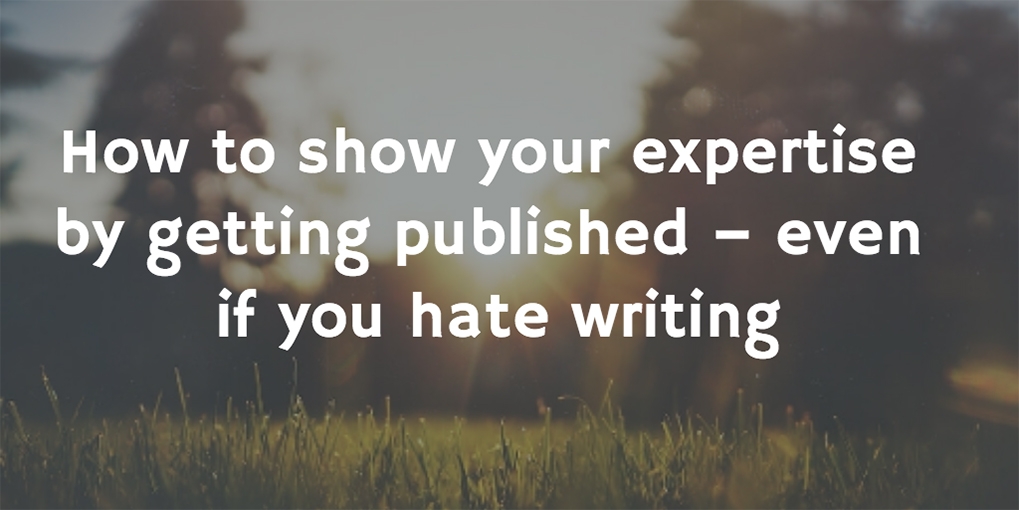Maybe you’ve seen that another independent professional, someone you know, has published an article in a business magazine. Or, this person has a well-regarded blog with hundreds of subscribers. Maybe they’ve produced a white paper that’s getting great reviews.
You know the importance of building your professional profile through publishing your ideas. But you hate writing. Maybe English isn’t your first language, and you’re not confident as a writer. So how can you get your ideas published?
There is help available. Here are some ideas on how you can get your ideas published, even if you hate writing.
Can you talk better than you write?
Many people freeze up at the sight of a blank computer screen but are comfortable talking about their work with someone else. If this is you, go with your strengths. Talk, don’t write.
This might mean that you should focus on public speaking, seminars, panel participation and other live events. You’ll need to make notes on what you’re going to say, but you don’t need to write out your ideas in detail.
Or, go for electronic means to get your ideas across – through live or recorded webinars, online courses, videos, and audio podcasting.
You’ll need to summarize your ideas before you present them verbally, but again, you’re spared the agony of filling up a screen with detailed text. Many business professionals have attracted substantial followings on audio podcasts (possibly hosted on iTunes) or their video channel on YouTube or Vimeo.
But you’re still getting your ideas in front of potential clients, showing your expertise in the spoken word. Some future customers will prefer to learn from you through video. Others like audio – and personally, I’ve had some of my best learning experiences through audio podcasts downloaded through iTunes, as I’m exercising.
Why you still need to create some information in text
It’s important to note that for your content to get found online, you’ll need to create some text. It includes the search terms that a potential listener or viewer will use. It’s because search engines such as Google can’t scan audio content, just text. Google also can’t scan images, so your text must be in ASCII form – in other words, not an image, but ‘real’ words such as this text.
So, you need to create some text with the right keywords, so that someone looking online will find it.
The short text comes in the description of the video or other content. You should also generate “show notes” that go with the audio or video file, that providing a summary. Partly because some of your potential clients will prefer to get their information in text form, and it’s necessary that such search engines will find it. You then attach the show notes to your video or audio file.
How do you generate that text, if you hate writing? Borrow some of the ideas I’ll get into below.
Transform the spoken word to text, then edit
While audio and video have their place. Let’s say you really want to get your ideas into text form – articles, blog posts, white papers, and books. Here are five types of communication experts who can help you.
Transcribers: If you’d rather talk than write, go ahead and speak. Talk into a recording device -- for instance, I use the iTalk app on my iPhone. Next you have two ways to get your ideas into text:
1. There are many transcription services that will turn your recorded interview or other audio file into text. Typical rates are about US$1/minute of recording. I work through a transcriber I found via the freelance service Upwork (upwork.com). She’s based in Cairo, and I rather like the idea of creating employment for someone in a part of the world where good jobs are scarce.
2. You can also use transcription software – it takes a while to learn your voice, but eventually will turn out a good version of what you said.
Freelance writers: You can easily find a writer – perhaps, a former journalist – who will interview you and write a first draft of the text based on what you have to say. You can edit the text for accuracy, and request changes as needed. Good talent doesn’t come cheap, but the result will be something that does you credit.
Substantive editors: This kind of professional will take your rough first draft and rewrite it to make the ideas sing.
Copy editors: If your work needs only minor changes to make it presentable, a copy editor is the way. Not that they “copy” your work – the word “copy” is journalist-speak for any kind of writing.
Proofreaders: Your work may need minor spelling corrections, grammar corrections, and checks to be sure that you’re being consistent in the voice you’re using. A proofreader is the kind of detail-obsessed professional you need.
So you see, the “I hate writing” doesn’t have to be a barrier for getting your ideas published. Just find the kind of support you need.


